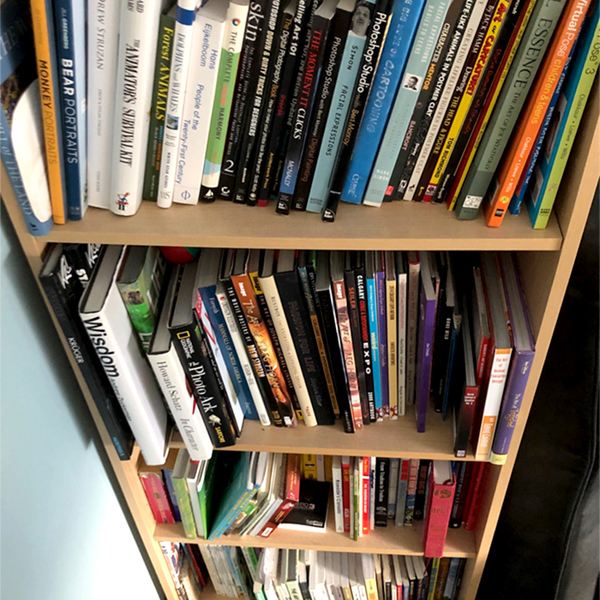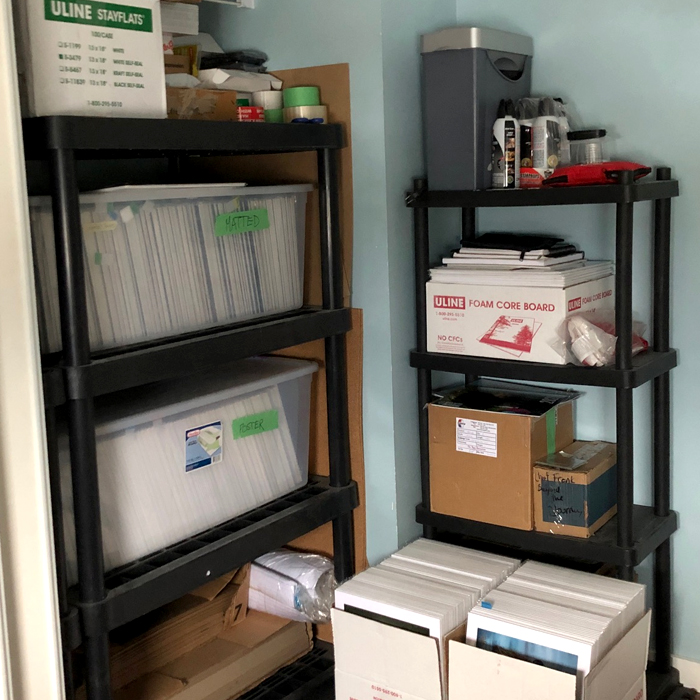
On New Year’s Day, I threw out my Photoshop World Guru Awards.
It wasn’t an impulsive move, but something I’d thought about many times the last couple of years.
When it comes to endings and beginnings, it would make more sense for each person to have some serious annual reflections on his or her birthday, truly the turning of a new year for each of us.
But New Year’s Day works for most because it’s the turning of a big number and a new calendar.
I began the year with a new painting. It’s not something I do every year but were I to have a tradition, that seems like a good one to me. Start another trip around the sun by making the work I love most a priority. It sets a precedent.
Following a couple of hours of painting, however, I suddenly had the urge to clean up my office.
For the most part, I keep a tidy space, but like anyone, papers pile up, items land in corners, and unoccupied floor space suddenly gets filled. Then it all begins to gather dust.
My office occupies the entire second bedroom of our townhouse condo and most of the time; it’s well organized. We’re not big consumers, so we don’t have much clutter. And still, even with shelving in the closet, bookcases, two large desks and ample drawer space, stuff accumulates.
 My closet is floor to ceiling shelving. In multiple large alphabetized bins is my inventory of hundreds of prints. Boxes of canvas prints, support materials for my booth at Expo, large rigid print mailers, foam core backer board, cellophane sleeves, magnets, coasters, aluminum prints, a variety of packing material, and other sundries that go with this art-for-a-living operation. This is just one end of it, the other looks similar.
My closet is floor to ceiling shelving. In multiple large alphabetized bins is my inventory of hundreds of prints. Boxes of canvas prints, support materials for my booth at Expo, large rigid print mailers, foam core backer board, cellophane sleeves, magnets, coasters, aluminum prints, a variety of packing material, and other sundries that go with this art-for-a-living operation. This is just one end of it, the other looks similar.
If allowed free-range, it could quickly turn wild.
In drawers, you’ll find replacement ink cartridges and paper for my printer, pens, paper clips, staples and the supplies that go with any office. Add to that empty, half-filled and filled sketchbooks of various sizes, and plenty of art supplies for sketching, even though these days, I primarily work digitally.
Among those necessities, there exists the things I hang onto that have outlived their usefulness.
Dozens of art prints I’ve bought from other artists over the years that I always intend to frame and put up. Many people have a collection like this, but especially artists. We love to buy new pretty pictures, even if they’re eventually filed away with the ones we’ve bought before.
There are images of my own work, special edition productions I’ve done where I’ve printed too many, just to be on the safe side. There’s nothing wrong with them, aside from the low demand, but I can’t seem to recycle them, and giving them away feels like a slap in the face to those who actually paid for one.
Odds and ends of packing material with no use, kind of like the stale ends of a loaf of bread, kept in the unlikely chance they might be of use later.
There is a large box of computer cords and other gadgets or parts, either obsolete or won’t connect to any current equipment, but there was that time years ago when I needed something like that and didn’t have one. Just don’t ask me to recall when that was.
Finally, on the top shelf, there are empty product boxes. For the iPad, iPhone and Apple Pencil I bought more than two years ago. Just in case I need to return one? A box for a camera lens, to replace the one that broke when I slipped on a Vancouver Island beach more than two years ago. I still have the broken lens, too, because it was expensive.
What it all comes down to is something called sunk costs.
You can find long explanations of the term online, a lot of them having to do with accounting and business expenses, but the short version, as I understand it, is that we often make bad decisions and hang onto things, because they once had value, even if they don’t anymore.
Say you bought a computer monitor ten years ago. Even though it has dead pixels, the colour shifts, it makes a weird humming sound, is too small for your current needs, and the one you’ve got now is so much better, that old monitor still sits in the corner of your basement or garage, taking up space. Because you spent good money on it and somehow keeping it around means you didn’t lose that money.
We keep things long after they no longer have value to anyone because throwing it out not only feels wasteful, but we think that if we keep it, the money isn’t really gone if we still have the thing we bought.
 It’s the reason I have TWO four-shelf bookcases full of books even though I haven’t opened most of them in years. Some I have yet to read, but most of them are art books I don’t open anymore and likely never will again. But I spent money on them, so it seems like donating or recycling them now meant I wasted money when I bought them in the first place, even though that isn’t true.
It’s the reason I have TWO four-shelf bookcases full of books even though I haven’t opened most of them in years. Some I have yet to read, but most of them are art books I don’t open anymore and likely never will again. But I spent money on them, so it seems like donating or recycling them now meant I wasted money when I bought them in the first place, even though that isn’t true.
What about Kijiji? I could still get five or ten bucks for some of this stuff. But since it isn’t wise to invite strangers to my home, that means I’m going to sit in a parking lot somewhere, waiting for somebody to show up on time, if he shows up at all, to make $10, when I would make more than that spending my time working on a cartoon or painting.
Time is the most valuable resource we have and turning my old stuff into a travelling yard sale is a poor use of mine.
A good friend of mine is a whiz with musical instruments. He’ll pick up a beat-up guitar at a pawn shop, take it home, disassemble it, clean up the parts, install new ones for broken pieces, and give it new life. Then he’ll sell it for more than the original cost and his time, making a tidy profit. He enjoys both the hunt for the instrument and bringing it back to life.
That’s not the same thing as trying to get $5 for an old pair of PC headphones that are long obsolete.
In addition to those headphones, and another set, a portable drawing table, some promotional valise type carrying cases, and various other odds and ends, I donated a large box of stuff to the local thrift store last week.
A small tube TV I’ve had in my office since we lived in Banff in the 90s went to electronic recycling, along with a radio, and the useless computer cords. I hadn’t turned that little TV on in over a year, not since we killed our cable.
And in a couple of garbage bags that went to the dumpster were my three Guru Awards from Photoshop World.
Winning those awards meant a great deal to me. Professionally, it gave me credibility as an expert in digital painting. The first in 2010 was for the Illustration category, the second that same year for Best in Show. It was a sense that I had finally arrived, that I wasn’t kidding myself about the quality of my work.
It introduced me to Wacom, which led to working with them.
The third award in 2014, was again for Best in Show. The prize was my Canon DSLR camera, which changed my whole process. Taking reference photos became as important a part of my painted work as the painting itself. Today, one doesn’t exist without the other. It was the last time I would attend Photoshop World, a period in my life I remember fondly.
The conference itself has withered in recent years, with attendance dropping off. The community of friends I knew, none of them go anymore. And these days, outside of that group, most people don’t even know what the award represents.
Winning the awards mattered to me, the doors they opened mattered to me, the recognition mattered to me. Those three large chunks of acrylic gathering dust on the shelf don’t matter to me, and they certainly don’t matter to anyone else. For the most part, nobody spends time in my office but me.
I asked myself, “Do I need to keep these?”
The answer landed them in the garbage bag, and three days later, as I write this, I have no regrets. Those laurels are in the past and if I’m still defining my worth by awards I won 6 and 10 years ago, that’s a problem.
Getting rid of useless stuff feels like dropping a heavy pack after a long hike, suddenly realizing how much weight was on your back.
The awards, the TV, those computer cords and all of that stuff I haven’t touched in years, I can’t give you a good reason why I hung onto any of it as long as I did, other than the fact that at one time, they had value.
If your home burned to the ground, what do you currently own that you wouldn’t even consider using the insurance money to replace? Look around. If it was suddenly gone, would you repurchase it? That’s the first clue you no longer need it.
It’s all baggage, the stuff that belonged to who we used to be that holds us back, shit we carry that prevents us from moving forward.
As Tyler Durden said in Fight Club, “Things you own, end up owning you.”
Up next, the bookshelves.
__________________
© Patrick LaMontagne
@LaMontagneArt
If you’d like to receive my newsletter which features blog posts, new paintings and editorial cartoons, follow this link to the sign up form.
